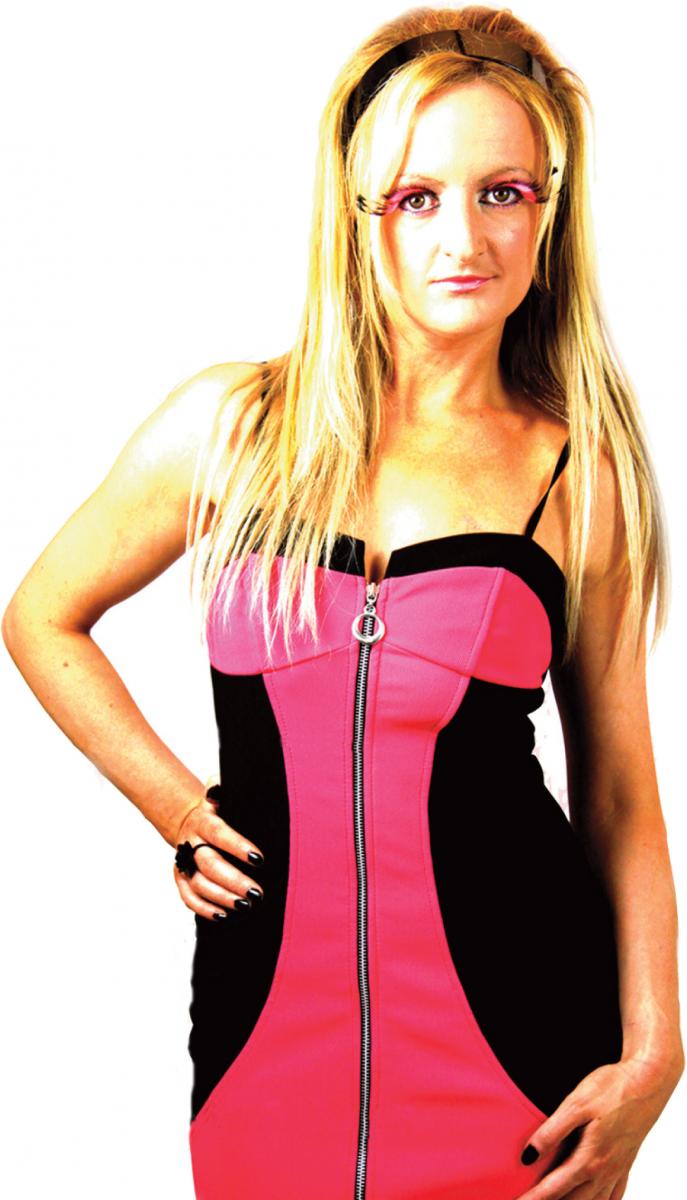On the borderline with Kayla Kavanagh – A person behind the disorder
By Charlotte Fantelli
A musical star
Kayla Kavanagh first came to my attention on Facebook. Within moments of browsing her website I was a fan. I couldn’t get over the talent that one person could hold. Not only does Kayla take part in every aspect of making her music – she plays countless instruments and sings like an angel – she has also developed a unique way of ‘live looping’ that means she can play and sing simultaneously on stage alone.

Who is Kayla Kavanagh?
A bit of a diva you might think? Someone who possesses skills as diverse as Kayla’s would surely be confident and self-assured, right? Wrong! She could not be more humble. It is only through music that Kayla has even found strength to accept herself. She, like a reported two per cent of adults, suffers with Borderline Personality Disorder (BPD). Kayla tells us how she battled a long road before her diagnosis, and how music saved her life.
The start of Borderline Personality Disorder
You may also like to read
What is Borderline Personality Disorder
I had grown up with bipolar and autism in the family, so I was well aware of mental health problems, but it wasn’t until I was 11 years old that I experienced any problems first-hand.
It was day three at senior school. My primary education had gone fine, but here I was in a new place, daunted by the unfamiliar people and surroundings. I just remember being extremely fearful. This time in my life coincided with some traumatic life events and I saw school as a terrible separation from my home and family, which was the only place I felt safe.
‘It was so bad I just knew I had to go home. I faked a back injury and ended up staying off school for three months.’
I returned to school but things were tough, I felt anxious and didn’t want to be away from home a moment longer than I needed to be. This meant that friends, after-school activities and trips were out of the question. I spent three years not even trying to fit in.
When I was 14, I felt under pressure to try not to be so much of an outsider. I was lonely, always trying to fit in, never really knowing my place. My personality always mirrored that of the people around me in an attempt to be liked, but I found it hard to find who I was underneath this false front. I pushed myself to join in with activities, I even joined the drama club but found it a real struggle. I remember one day I pushed myself so hard I went home and sat alone in my room, just numb – I felt I didn’t belong anywhere, I felt so alone. This was the first time I self-harmed. At the time it was a way of expressing how I felt inside – a release I could not put into words – but ten minutes later all I felt was hurt and very ashamed.
Music saved my life
At 15 I started to discover music and immediately fell in love with it. I suppose looking back now I can understand that black-or-white, all-or-nothing characteristic of my illness, but back then it just became a burning passion. I started playing and soon I could play five instruments. Kinda obsessive, I had found an escape, and one that was constructive, rather than destructive.
Music gave me the opportunity to make friends as well: I would go to the music room in break-time, and from sitting on my own playing the piano, other people came to join me. I found music helped me integrate and communicate with people.

My academic studies focused on my love of music and I decided to go to university to further myself and learn as much about the subject as I could. The transition to uni wasn’t as hard as I had expected. Pouring myself into my music gave me focus and determination, but again I couldn’t just do the minimum, I had to do everything! I had two bands on the go, I was writing my own songs, going horse riding – so many extracurricular interests and activities that I worked myself too hard. At uni I once again experienced some tough times and this fuelled a meltdown.
I was fortunate to have great people around me and I was given six months off to recover, which I did. I returned to complete my second year and I caught up well. It was during this time that I realised my love was more for the technology than the classical music that I was studying, but I continued and completed my degree.
After uni I did what lots of people do: I spent a few years doing this and that – web design and other bits and bobs – but always worked on my music. I played pubs and clubs just so I could have those moments with my music.
In 2006 I found a one-year digital Masters degree at Hull and decided to further the passion I had found for music technology. It was here that I learned how to live loop, which I now use a great deal in my performances.
While studying I met Nigel, who was into producing. I started working with him, and very soon we fell in love. It has now been four and a half years since we met and we are still going strong. Not that it has all been a bed of roses. He has been a rock to me, and has had to deal with a lot.
Attempted suicide
You may also like to read Borderline Personality Disorder – A tribute to Louise Wright
In April 2007, I took a really bad turn. It is hard to remember all the details but I hit a real low. It all came to a head one day: the worst day. I remember texting Nigel, all it said was: I can’t do this any more, goodbye. The next thing I remember is being fished out of a lake by the police.
The detail is blurred, I felt as though I wasn’t there, like I was kind of dreaming. I later realised this is termed depersonalisation and was a symptom of the BPD at that time.
I don’t know exactly what drove me to that point, but starting out in music was hard, especially with my self-image and self-esteem issues. I hated social situations and I felt as though everyone hated me. It sounds strange that I hated being around people and crowds but I wanted to be in music – I think it only worked because when I was on stage I put on a mask. I was ‘Kayla the singer’ and ‘Kayla the musician’: I had a facade, a show to put on. But I soon felt the knocks when the mask came off.
Becoming an NHS ‘service user’
It took two whole years for me to get the help I needed after that night, despite being seen by the NHS and the police whilst I was in crisis. They didn’t comprehend that just because I was out of the lake, I wasn’t out of my crisis: I still needed help. Nigel had to give up work, as caring for me was becoming a full-time job in itself.
 In April 2009, I went through six weeks of screening and assessment and was given the opportunity to talk about my issues and how I was feeling. This turned into six months of therapy that was again extended until just this month. I asked to see my notes last year as I wasn’t given a diagnosis. I looked through the reams of paper, and there it was: BPD – Borderline Personality Disorder.
In April 2009, I went through six weeks of screening and assessment and was given the opportunity to talk about my issues and how I was feeling. This turned into six months of therapy that was again extended until just this month. I asked to see my notes last year as I wasn’t given a diagnosis. I looked through the reams of paper, and there it was: BPD – Borderline Personality Disorder.
I was a little scared because I didn’t know much about the condition and it sounds rather scary, but I was also very, very relieved. Relieved to know it wasn’t bipolar which I thought it might be due to the family history. But even more than this, I was relieved I had finally got a name for what I was suffering. I now knew the name of the thing I had to face. I know some people fight for the labels to be lifted, and others dislike the title of the disorder, but to me it was a diagnosis, a reason, a hope that I could now focus on getting better.
I worked hard at learning more about my condition and the things I can do to help manage it. I am now an advocate and a service user worker, working in any way I can to raise awareness of this condition and help break the stigma attached to it.
Living with BPD
Within six months of reading my notes I was speaking at the National Personality Disorder Congress in front of 250 professionals.
My life today consists of mental health and music: a reflection of myself, and I really feel like I have a purpose and a place. And of course having the support of Nigel has really helped me through.
Musically, I toured this year and have bought out my first album Stranger than Fiction which is a kind of Eva Cassidy meets country rock. It is doing really well and I look forward to the future.
I still struggle with my condition and have good days and bad days, but with the help of music I can express myself and heal in a way I never could have without it. It is true: music really did save my life.
Further help on Borderline Personality Disorder
We hope you have found this information useful, please also see
What is Borderline Personality Disorder
Borderline Personality Disorder Symptoms
Borderline Personality Disorder Treatments
Living with Borderline Personality Disorder
Borderline Personality Disorder - A tribute to Louise Wright
Louise Wright's family speak out about BPD
Borderline Personality Disorder - Basic Facts from SANE
Kayla’s album Stranger than Fiction is available now from her website: www.kaylakavanagh.com





